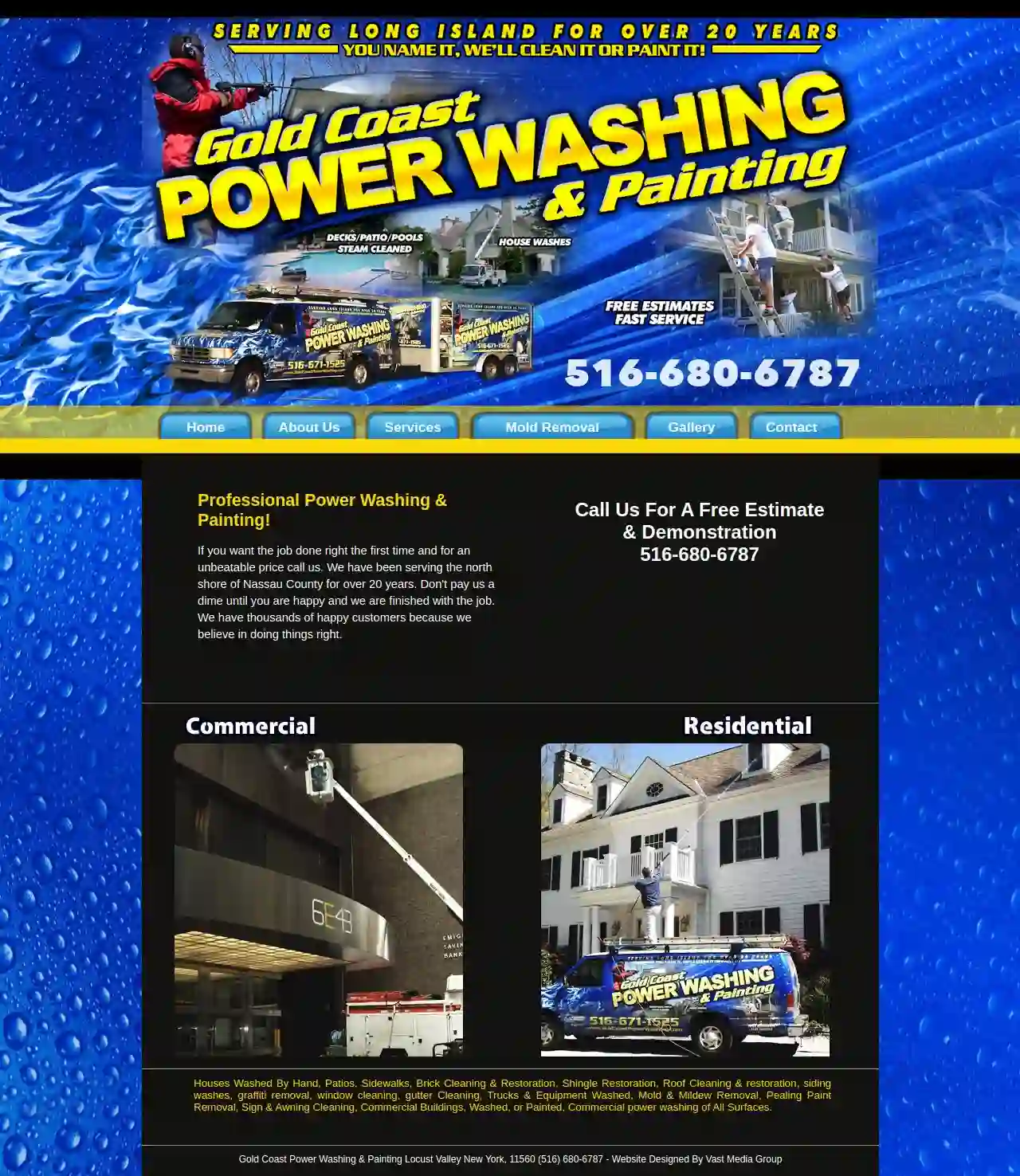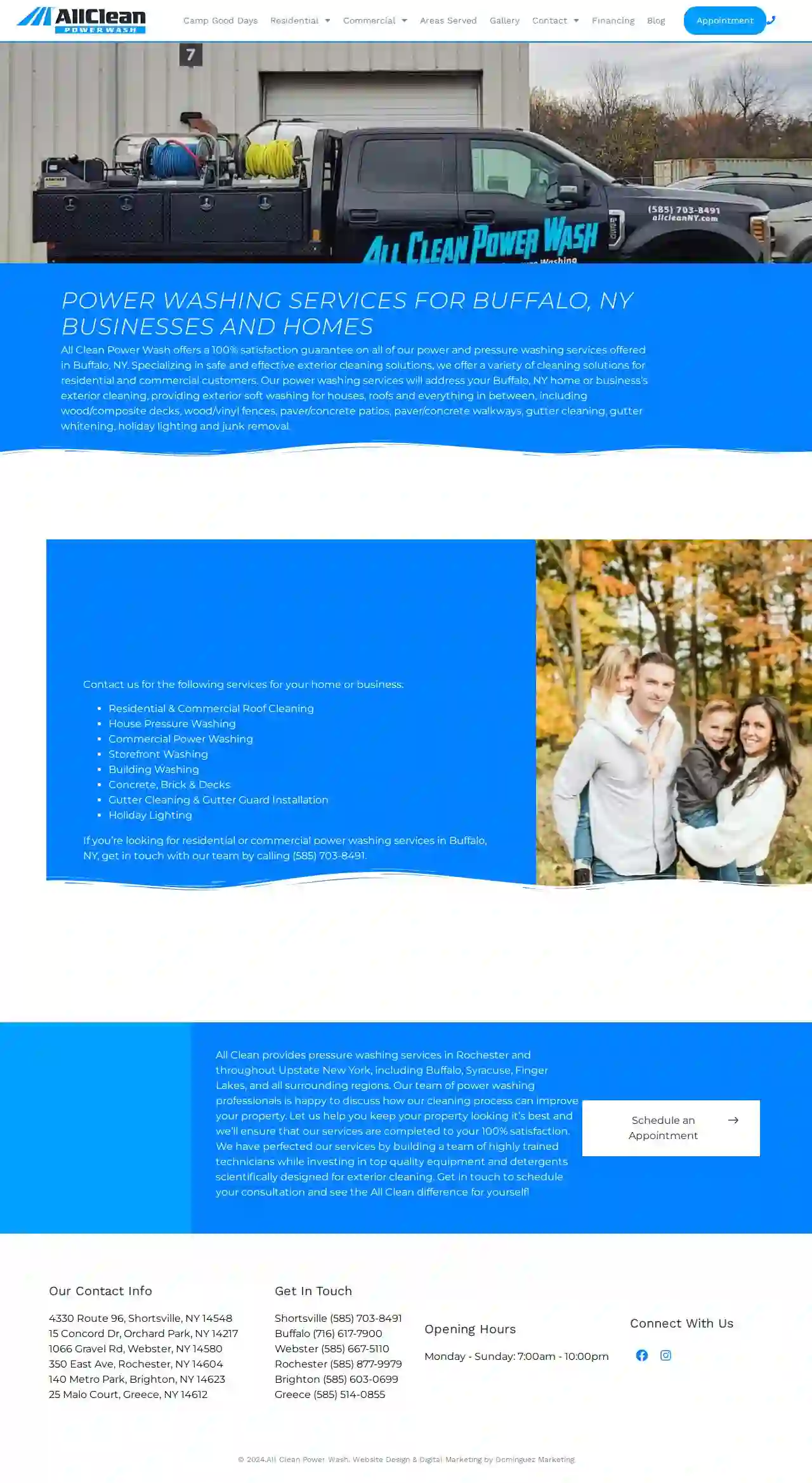Pressure Washing Marion
Top Power Washing in Marion
Receive multiple Pressure Washing quotes for your project today! Compare profiles, reviews, accreditations, portfolio, etc... and choose the best service.

Gold Coast Power Washing
4.714 reviews5 Brewster Street, #305, Glen Cove, 11560, USGold Coast Power Washing & Painting is a family-owned and operated business serving the North Shore of Nassau County for over 20 years. We are dedicated to providing top-quality power washing and painting services to both residential and commercial clients. Our mission is to become Long Island's #1 Power Washing company by exceeding customer expectations with every project. We pride ourselves on our experience, expertise, and commitment to customer satisfaction. Our team of skilled professionals utilizes state-of-the-art equipment and techniques to deliver exceptional results. Whether you need a simple house wash or a complex commercial building restoration, we have the knowledge and resources to handle it all. At Gold Coast Power Washing & Painting, we believe in: Providing unbeatable prices and transparent pricing. Ensuring customer satisfaction by completing the job right the first time. Offering a free estimate and demonstration to all potential clients. Maintaining a clean and professional work environment. Providing excellent customer service and building lasting relationships. We are fully insured and licensed, giving you peace of mind knowing your property is in safe hands. Contact us today for a free estimate and let us transform your property with our professional power washing and painting services.
- Services
- Why Us?
- Our Team
- Gallery
Get Quote
Moore Power Washing
598 reviews210 Vesta Street, Belmont, NC, 28012, USMoore Power Washing offers professional and efficient exterior cleaning services including high PSI commercial-grade pressure washing, soft wash roof cleaning, and low-pressure house washing. Our goal is to earn your trust and exceed your expectations with fast, affordable, and reliable service. We are fully insured for commercial and residential services and always offer our ironclad 100% satisfaction guarantee.
- Services
- Why Us?
- Accreditations
- Our Team
- Testimonials
- Gallery
Get Quote
Pressure Guys LI
55 reviewsP.O. Box 781, East Northport, 11731, USThe Pressure Guys are Long Island’s premier Power and Soft Washing company servicing Central Long Island. We specialize in cleaning home facades, roofs, patios, fences, driveways, and most all outdoor surfaces in a safe and environmentally responsible way.
- Services
- Why Us?
- Accreditations
- Our Team
- Testimonials
- Gallery
Get Quote
Magic Touch Cleaning & Maintenance
510 reviewsRidgewood, NY, 60-68 Metropolitan Ave., 11385, USWelcome to Magic Touch Cleaning & Maintenance, proudly serving Queens, Brooklyn, and Manhattan for over 20 years. We provide a wide range of cleaning and maintenance services, including sidewalk restoration, vinyl floor stripping and waxing, tile floor and grout restoration, property maintenance, snow plowing, graffiti removal, and more. Our team is dedicated to providing exceptional service and attention to detail, ensuring that every customer is completely satisfied with our work. With a reputation for quality and innovation, we are the go-to choice for commercial and residential clients alike.
- Services
- Why Us?
- Gallery
Get Quote
Pressure Washing 716
57 reviews123 Main St, Buffalo, 14207, USPressure Washing 716 is your local, family-owned and operated pressure washing company serving the Buffalo, NY area. We are dedicated to providing high-quality pressure washing services at competitive prices. Our team of experienced professionals uses the latest equipment and techniques to ensure that your property looks its best. We offer a wide range of services, including residential and commercial pressure washing, roof cleaning, and more. Contact us today for a free estimate!
- Services
- Why Us?
Get Quote
Buffalo Exterior Power-washing Specialist
51 reviewsShortsville, NY, N/A, 4330 Route 96, 14548, USAll Clean Power Wash offers a 100% satisfaction guarantee on all of our power and pressure washing services offered in Buffalo, NY. Specializing in safe and effective exterior cleaning solutions, we offer a variety of cleaning solutions for residential and commercial customers. Our power washing services will address your Buffalo, NY home or business’s exterior cleaning, providing exterior soft washing for houses, roofs and everything in between, including wood/composite decks, wood/vinyl fences, paver/concrete patios, paver/concrete walkways, gutter cleaning, gutter whitening, holiday lighting and junk removal.
- Services
- Why Us?
- Accreditations
- Our Team
- Testimonials
- Gallery
Get Quote
Powerhouse Pressure Washing LI
5129 reviewsWantagh, 11793, USWe provide high-quality pressure washing services to the communities in and around Wantagh, NY. Our team has years of experience prepping surfaces for painting, as well as washing away dirt and mold to make homes look brand new. Call today for pressure washing, power washing, and pressure cleaning.
- Services
- Why Us?
- Our Team
- Testimonials
- Gallery
Get Quote
Clean WNY - Pressure Washing & Soft Washing
56 reviewsUSWESTERN NEW YORKS PREMIER RESIDENTIAL/COMMERICAL EXTERIOR CLEANING SERVICES Restore the look of your home Instantly with our Five Star Exterior Cleaning Services! At Clean WNY, we pride ourselves on being the premier destination for professional pressure washing and soft washing services. With a commitment to excellence, we specialize in rejuvenating your property’s exterior, making it look as good as new. Our experienced team tackles a range of services, from roof cleaning to house washing, gutter cleanouts, and driveway revitalization. We understand the value of your time, providing fast, affordable, and top-notch services to both residential and commercial customers. At Clean WNY, we’re not just cleaning; we’re transforming your property to make it look great again. Our exterior cleaning services go beyond the ordinary, catering to the diverse needs of our valued clients. From low-pressure house washes to meticulous fence and patio cleanings, we handle every project with precision and care. Oil and rust stain removal, along with gutter cleaning, are among the many services we excel in. Choose Clean WNY for a reliable partner that delivers outstanding results, ensuring your property stands out with its renewed beauty and pristine appearance.
- Services
- Why Us?
- Accreditations
- Our Team
- Testimonials
- Gallery
Get Quote
All Season Wash LLC
4.47 reviews123 Main St, Apt 4, Bronx, 10456, USAll Season Wash LLC is a top-tier name when it comes to effective and affordable exterior cleaning services in Bronx, NY. We specialize in properly cleaning properties, driveways, patios, trucks, and more. Using specialized nozzles and maintaining an appropriate spray distance, we ensure the thorough removal of grime, stains, and mold. Our pressure washers have hands-on experience and certified skills in executing each task efficiently. We work to not only improve the curb appeal of your property but also to keep it clean. With our expertise and work-proven techniques, we are skilled at delivering meticulous outcomes every time. We are available to assist you with any cleaning or maintenance needs, whether they be one-time or ongoing. Need affordable exterior cleaning services in Bronx, NY? Give us a call!
- Services
- Why Us?
- Accreditations
- Our Team
- Testimonials
- Gallery
Get Quote
DC Painting & Pressure Washing
530 reviews123 Main St, Suite 101, Hurricane, 25526, USDC Painting & Pressure Washing is a painting and pressure washing service based in Hurricane, WV. The company is owned by David Clark, who has been in the painting industry for 18 years. DC Painting & Pressure Washing offers exterior and interior painting, staining, drywall repair, and pressure washing services. The company serves various areas including Milton, Teays Valley, Winfield, Hurricane, Charleston, Barboursville, Ona, South Charleston, Huntington, Dunbar, Culloden, and the Tri State Area. The company has received positive testimonials from clients, highlighting their attention to detail, quality work, and customer service.
- Services
- Why Us?
- Accreditations
- Our Team
- Testimonials
- Gallery
Get Quote
Over 60,241+ Cleaning Companies onboarded
Our cleaning companies operate in Marion and surroundings!
CleaningMatch has curated and vetted the Best Cleaning Services near Marion. Find the most trustworthy contractor today.
Frequently Asked Questions About Pressure Washing
- Wood Siding: High-pressure washing can damage wood fibers, leading to splintering or etching. Soft washing is the recommended method for cleaning wood siding.
- Asphalt Shingles: High-pressure water can dislodge granules from asphalt shingles, reducing their lifespan. Soft washing is a gentler alternative for roof cleaning.
- Painted Surfaces: High pressure can strip paint from surfaces. Always test pressure washing on an inconspicuous area before cleaning painted surfaces.
- Windows and Screens: The force of pressure washing can break windows or damage delicate window screens. Traditional cleaning methods are better suited for windows and screens.
- Pressure Washing: If your siding is in good condition but dirty or stained, pressure washing can effectively restore its appearance without the need for painting.
- Painting: If your siding is faded, chipped, peeling, or damaged, pressure washing alone may not be sufficient. Painting provides a fresh coat of protection and a new look.
- Pressure Washing Before Painting: Pressure washing is an essential step before painting, as it removes dirt, grime, and loose paint, creating a clean surface for the new paint to adhere to.
- Regular Cleaning: Sweep or rinse surfaces regularly to prevent dirt and grime from building up.
- Address Stains Promptly: Clean up spills or stains as soon as possible to prevent them from setting in.
- Trim Vegetation: Keep trees and shrubs trimmed away from surfaces to minimize shade, which can promote mold and mildew growth.
- Apply Protective Coatings: Consider applying protective sealants or coatings to surfaces like decks or fences to repel water and dirt, extending their lifespan and maintaining their appearance.
- Schedule Periodic Pressure Washing: Schedule periodic professional pressure washing to maintain the cleanliness and appearance of your surfaces over time.
- Degreaser: For optimal results, pre-treat the oil stains with a degreaser specifically designed for driveways. Allow the degreaser to sit for the recommended time before pressure washing.
- Hot Water: Using hot water in your pressure washer can be more effective at breaking down oil than cold water.
- Surface Cleaner: Using a surface cleaner attachment for your pressure washer can provide a more even and efficient cleaning result.
Is pressure washing safe for all surfaces?
Always consult with a professional pressure washing company to determine the appropriate cleaning method for your specific surfaces.
Is it better to pressure wash or paint my house?
Assess the condition of your siding and your desired outcome to determine whether pressure washing, painting, or a combination of both is the best approach.
What are some tips for maintaining my pressure washed surfaces?
By implementing these maintenance practices, you can prolong the results of your pressure washing and keep your surfaces looking their best.
Can pressure washing remove oil stains from my driveway?
If DIY pressure washing doesn't completely remove the oil stains, consider hiring a professional pressure washing company. They have specialized equipment and experience in dealing with stubborn stains.
Is pressure washing safe for all surfaces?
- Wood Siding: High-pressure washing can damage wood fibers, leading to splintering or etching. Soft washing is the recommended method for cleaning wood siding.
- Asphalt Shingles: High-pressure water can dislodge granules from asphalt shingles, reducing their lifespan. Soft washing is a gentler alternative for roof cleaning.
- Painted Surfaces: High pressure can strip paint from surfaces. Always test pressure washing on an inconspicuous area before cleaning painted surfaces.
- Windows and Screens: The force of pressure washing can break windows or damage delicate window screens. Traditional cleaning methods are better suited for windows and screens.
Always consult with a professional pressure washing company to determine the appropriate cleaning method for your specific surfaces.
Is it better to pressure wash or paint my house?
- Pressure Washing: If your siding is in good condition but dirty or stained, pressure washing can effectively restore its appearance without the need for painting.
- Painting: If your siding is faded, chipped, peeling, or damaged, pressure washing alone may not be sufficient. Painting provides a fresh coat of protection and a new look.
- Pressure Washing Before Painting: Pressure washing is an essential step before painting, as it removes dirt, grime, and loose paint, creating a clean surface for the new paint to adhere to.
Assess the condition of your siding and your desired outcome to determine whether pressure washing, painting, or a combination of both is the best approach.
What are some tips for maintaining my pressure washed surfaces?
- Regular Cleaning: Sweep or rinse surfaces regularly to prevent dirt and grime from building up.
- Address Stains Promptly: Clean up spills or stains as soon as possible to prevent them from setting in.
- Trim Vegetation: Keep trees and shrubs trimmed away from surfaces to minimize shade, which can promote mold and mildew growth.
- Apply Protective Coatings: Consider applying protective sealants or coatings to surfaces like decks or fences to repel water and dirt, extending their lifespan and maintaining their appearance.
- Schedule Periodic Pressure Washing: Schedule periodic professional pressure washing to maintain the cleanliness and appearance of your surfaces over time.
By implementing these maintenance practices, you can prolong the results of your pressure washing and keep your surfaces looking their best.
Can pressure washing remove oil stains from my driveway?
- Degreaser: For optimal results, pre-treat the oil stains with a degreaser specifically designed for driveways. Allow the degreaser to sit for the recommended time before pressure washing.
- Hot Water: Using hot water in your pressure washer can be more effective at breaking down oil than cold water.
- Surface Cleaner: Using a surface cleaner attachment for your pressure washer can provide a more even and efficient cleaning result.
If DIY pressure washing doesn't completely remove the oil stains, consider hiring a professional pressure washing company. They have specialized equipment and experience in dealing with stubborn stains.